この記事は次の言語でも読めます:日本語

Stout Vocational Rehabilitation Institute (SVRI) is located at University of Wisconsin-Stout. SVRI provides various kinds of supports, trainings, and services for people with disabilities.
Their goal is to be the premier resource for state-of-the-art knowledge, innovation, and services to positively impact people’s health, employment, and economic stability.
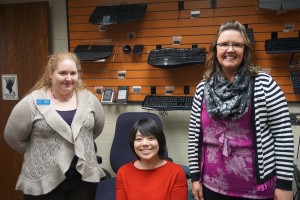
I had a great opportunity to interview Ms. Meghan Donahue (left), a rehabilitation engineer, and Ms. Becky Albricht (right), a director of services.
Meghan studied biomedical engineering. Her first job before joining SVRI was as a clinical rehabilitation engineer to provide assistive technology services at a hospital.
Becky studied education and teaching. She started out as a teacher and taught the special education population for many years. She joined SVRI this summer.
At first they showed me some places in SVRI.
1. Driving Simulation Lab has a driving simulator for driver’s readiness and driving training. You can prepare to take a driving test here.
2. Assistive Technology Lab has a wide variety of assistive technology such as keyboards, magnifiers, chairs, pens, and devices etc.
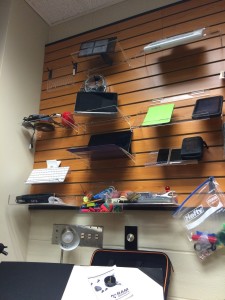
3. Accessible Apartment Room is used for simulation to determine if you are ready to live independently. There is a kitchen, living room, bathroom, and a bedroom with assistive equipment.
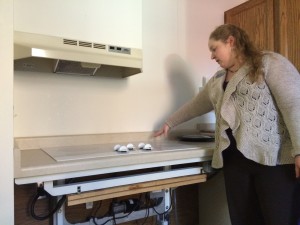
4. Fabrication Shop is a place to custom fabricate and modify assistive devices for specific needs.
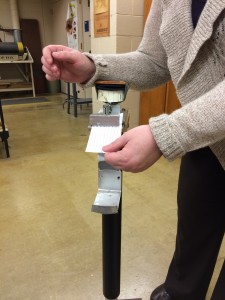
5. Mobility Lab holds many different kinds of wheelchairs such as a wheelchair with pedal operated or standing wheelchair and a pressure mapping device.
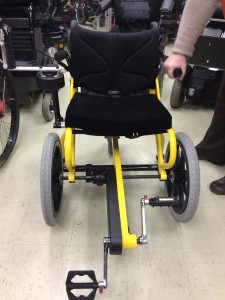
SVRI also provides many training services such as:
- Soft skills training: They provide trainings for social communication and learning of how to work with money, networking skills, and problem-solving techniques.
- Benefit analysis: They help people with disabilities figure out what kind of job and how much they can earn and still keep the government Social Security and all the different benefits. SVRI also helps people with disabilities figure how much they need to earn more in order to replace those benefits.
- IPS model: This model is for people with severe persistent mental illness at employment. SVRI provides training to these people to help them to integrate with their organizations. The approach is getting you a job first and then helping you to build skill sets ABC and D to keep you in the job, instead of helping you to build the skill sets ABC and D to meet a job description.
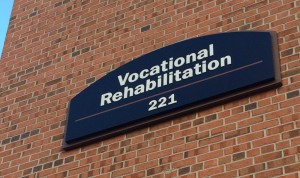
Division of Vocational Rehabilitation (DVR) gets involved as a middleman between SVRI and employers. Wisconsin has a strong DVR program that helps people with disabilities get a job and finds out what kind of accommodation they need and contact SVRI. DVR is the biggest vendor that pays for the services.
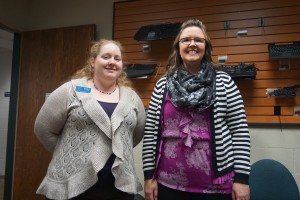
When Meghan was asked what she hopes for people with disabilities in the future, she responded
“ Many people with disabilities do not know how to advocate for themselves because many parents always take care of everything for their kids with disabilities since the children were young. At your place of employment, you would gain equal expectations as your colleagues by advocating and educating coworkers and management teams of what you can do or what you need in order to do work better. Some companies would like to arrange reasonable accommodations, but simply don’t know how. I believe that many assistive technologies would expand people’s abilities. I’m planning to do research and outcome measurement and developing tools that measure the impact of the assistive technology; the results could be used to assist with education and advocacy.”
Becky’s response:
“I’m hopeful for a future where people with disabilities and people without disabilities apply for jobs exactly the same way. I look forward to no one needing to check a box on their application that indicates ‘Yes, I use a wheelchair’ or ‘Yes, I use one of these 9,000 USD tools’. That is irrelevant. More important things are, ‘Where do your interests lie?’ ‘What can you bring to the table at our place of employment?’ When I post open positions at SVRI on a system like Craigslist or LinkedIn, I have to check a box that indicates the position is OK for telecommuters; ‘OK for people with disabilities’ or ‘OK for internships’ etc. In order to complete the posting, you have to select these categories. It will be a lovely thing when those pieces of information will not be indicated on applications or postings. We want accommodations to be the last things on applicants and employers minds.”
